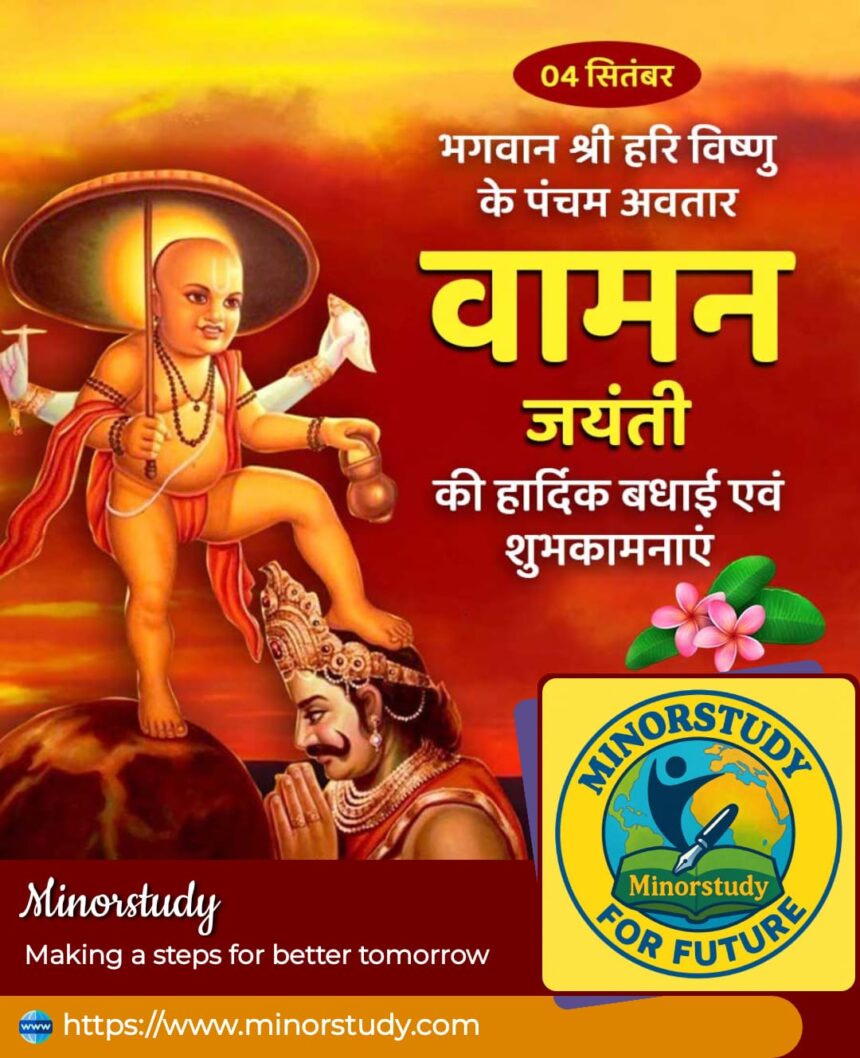✨ Introduction: Why Vaaman Jayanti Matters
India’s spiritual calendar is filled with festivals that celebrate not only gods and goddesses but also deep philosophies of life. One such festival is Vaaman Jayanti, which commemorates the birth of Lord Vishnu’s fifth incarnation – Vaaman Avatar, the dwarf Brahmin.
- ✨ Introduction: Why Vaaman Jayanti Matters
- 📜 History of Vaaman Jayanti
- 📅 Timeline of Vaaman Jayanti
- 📊 Interesting Facts about Vaaman Jayanti
- 🌺 Significance of Vaaman Jayanti
- 🙏 Observance and Rituals of Vaaman Jayanti
- 🎉 Wishing on Vaaman Jayanti
- 🌍 Importance in Daily Life & Society
- ❓ FAQs about Vaaman Jayanti
- 🪔 Conclusion: The Daily Life Impact of Vaaman Jayanti
This avatar holds a unique place in Hindu tradition because it symbolizes humility, wisdom, and the triumph of dharma (righteousness) over adharma (ego and arrogance). On Vaaman Jayanti, devotees remember how Lord Vishnu, in his dwarf form, restored cosmic balance by humbling the mighty King Bali.
Celebrated with devotion, rituals, and spiritual reflections, Vaaman Jayanti teaches us that true greatness lies not in power or wealth, but in truth, humility, and righteousness.
📜 History of Vaaman Jayanti
The story of Vaaman Jayanti finds its roots in the Bhagavata Purana, Vishnu Purana, and other ancient scriptures.
King Bali, the grandson of the noble Prahlada, was a generous but ambitious ruler of the Asuras (demons).
Through his strength, Bali conquered the three worlds – Heaven, Earth, and the Underworld. Even the gods under Lord Indra lost their kingdom.
Seeing this imbalance, Lord Vishnu decided to restore order. He incarnated as Vaaman, a short-statured Brahmin boy.
Vaaman approached King Bali during a grand yajna (sacrifice) and humbly asked for three steps of land.
Bali, proud of his power, laughed at the request and agreed.
Suddenly, Vaaman expanded into a cosmic form – covering heaven and earth with two steps. For the third step, Bali offered his head, showing humility.
Lord Vishnu placed his foot on Bali’s head, pushing him to the netherworld (Patala), but blessed him with immortality and the honor of being a just king.
This episode marks the victory of humility over pride, making Vaaman Jayanti a spiritually enriching festival.
📅 Timeline of Vaaman Jayanti
Ancient Era (Vedic-Puranic Age): Vaaman’s story first recorded in Puranas.
Medieval India: Temples dedicated to Vaaman built in Gujarat, Kerala, and Odisha.
Modern Times: Celebrated across India, especially in North India, Gujarat, Maharashtra, and parts of South India.
Present Day: Observed on Bhadrapada Shukla Dwadashi (12th day of bright fortnight of Bhadrapada month), usually around August–September.
📊 Interesting Facts about Vaaman Jayanti
Vaaman is considered the fifth avatar of Vishnu among the Dashavatara.
Unlike other avatars, Vaaman teaches the value of humility over physical power.
In Kerala, this legend is linked with Onam festival, which celebrates the annual visit of King Mahabali.
Vaaman Jayanti is observed with fasting, puja, Vishnu Sahasranama recitation, and charity.
King Bali is not portrayed as purely evil; he is revered for his generosity, making the story morally complex and inspiring.
Vaaman Avatar symbolizes the idea that divine intervention comes in subtle and unexpected forms.
The celebration often includes discourses on Dharma, meditation, and bhajans dedicated to Lord Vishnu.
🌺 Significance of Vaaman Jayanti
The spiritual importance of Vaaman Jayanti lies in its life lessons and values:
Humility over Ego: Even the mightiest king had to bow down to truth.
Sacrifice and Dharma: King Bali’s selflessness showed that dharma is above personal pride.
Cosmic Balance: Lord Vishnu restores balance whenever the world tilts toward adharma.
Equality in Society: The festival emphasizes that spiritual wisdom matters more than power or wealth.
In today’s world, these teachings inspire us to live ethically, humbly, and mindfully.
🙏 Observance and Rituals of Vaaman Jayanti
On Vaaman Jayanti, devotees engage in rituals filled with devotion and meaning:
Morning Fast & Bath: Devotees take a holy bath, wear clean clothes, and observe fasts.
Vaaman Puja: An idol or picture of Lord Vishnu (as Vaaman) is worshiped with flowers, incense, lamps, and mantras.
Mantra Chanting: Reciting Vishnu Sahasranama, Vaaman Stotra, or Bhagavad Gita shlokas.
Charity & Feeding the Poor: Since King Bali was generous, devotees perform daan (charity), annadan (feeding the hungry), and donation of clothes.
Katha Listening: The story of Vaaman Avatar is narrated in temples and homes.
Bhajan & Kirtan: Devotional songs glorifying Lord Vishnu.
Breaking the Fast: The fast is broken after evening prayers.
🎉 Wishing on Vaaman Jayanti
If you wish to greet someone on Vaaman Jayanti, here are some warm messages:
🌸 “May Lord Vaaman bless you with humility, wisdom, and peace this Vaaman Jayanti.”
🌸 “On this sacred Vaaman Jayanti, may your ego be replaced with kindness, and your life filled with divine grace.”
🌸 “Happy Vaaman Jayanti! Let us remember that true greatness lies in serving others with love and humility.”
🌍 Importance in Daily Life & Society
Vaaman Jayanti is not just a religious festival; it carries life-transforming lessons:
For Individuals: Teaches humility, patience, generosity, and the importance of surrendering ego.
For Families: Encourages sharing, charity, and teaching children the values of dharma.
For Society: Inspires equality, justice, and compassion. A reminder that even kings and leaders must stay humble.
For Spiritual Seekers: Reinforces faith in divine intervention and the belief that God always restores balance.
❓ FAQs about Vaaman Jayanti
Q1: When is Vaaman Jayanti celebrated?
It is observed on Bhadrapada Shukla Dwadashi, usually in August–September.
Q2: Who was King Bali?
King Bali, also called Mahabali, was an Asura king known for generosity, but his pride led to his downfall.
Q3: What is the message of Vaaman Avatar?
It teaches that ego destroys, while humility elevates.
Q4: How is Vaaman Jayanti connected to Onam?
In Kerala, Onam celebrates King Bali’s annual visit, symbolizing his continued blessings despite his defeat.
Q5: What are common rituals of Vaaman Jayanti?
Fasting, Vaaman puja, chanting Vishnu mantras, charity, and listening to Vaaman Katha.
🪔 Conclusion: The Daily Life Impact of Vaaman Jayanti
Vaaman Jayanti is more than a mythological remembrance – it’s a philosophy for modern living. In a world dominated by competition, materialism, and ego, this festival reminds us of the eternal truth: Humility is power.
From King Bali’s sacrifice to Vaaman’s divine intervention, the story is a beacon of light for individuals, families, and societies. By practicing humility, generosity, and dharma in our lives, we can restore not only balance within ourselves but also in the world around us.
So, the next time you celebrate Vaaman Jayanti, remember – it is not about rituals alone, but about transforming our hearts to be humble, just, and compassionate.
🌸 Wishing you a blessed and meaningful Vaaman Jayanti! 🌸







